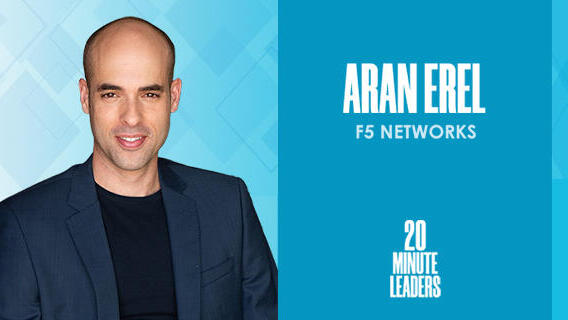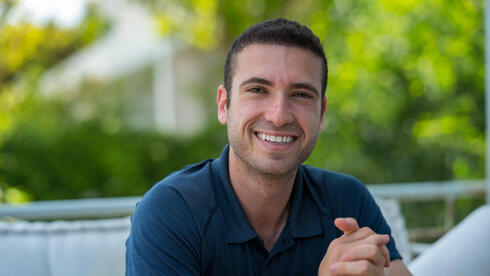
20-Minute Leaders
“I love technology and writing. They complement each other.”
Having his wife’s support and help has made it possible for F5's Aran Erel to combine his passion for technology with his love for writing.
Having his wife’s support and help has made it possible for Aran Erel to combine his passion for technology with his love for writing. His day job is being the country manager of Israel, Greece and Cyprus for F5, but he has also written two bestselling thriller novels. Erel says the first book would not have been published without his wife helping and believing in him. He notes that it is also essential that he supports her passions as well. He shares that the things he enjoys have become fun family activities as he writes stories with his kids and brings them to meetings and conventions. Erel explains that his novels include technology and his day job at F5 involves telling stories as well, so his two interests complement each other. He advises everyone to find work they love but also a hobby to help fulfill them.
Click Here For More 20MinuteLeaders
I have to say that you probably have the nicest work background that I have seen yet.
I'll tell my wife. This is one of the benefits of actually being married to an interior designer.
Tell me a little bit about who you are, what you do, and your career journey.
I have two disciplines that I wouldn't let go of. I'll talk about my career for a minute, and then I'm going to talk about writing and how everything works together for me. I was writing code in the army. Afterwards, I joined an integration company as an information security technical engineer. I love technology. Everything that I do is based on my love toward technology and building solutions with people. Later on, what I've done is actually I switched more to the business side. Within Cisco, it was managing the private sector. Later on within F5, what I do for the last three years is actually the country manager for Israel, for Greece, Cyprus, the Palestinian Authority as well, which is also interesting, the relationships that we are building toward by making business together with the Palestinian Authority.
My hobby is writing books. I've published two best-selling novels. What led me to actually writing the first book was a startup company that I formed right after the army. It ended badly. And when it ended, I had two options. Either I pursue some sort of legal action or sit in front of a blank page as I started writing it. It took me 49 days to put in writing my experience, which later on, five years later and through various iterations, turned into a 500-page, completely fictional novel. I love technology, and I love writing. I need both in my life because I think they complement each other.
How do you balance these aspects of your life and how are they different?
They are different, and they are not different. They are intertwined. Both of my books have some sort of a technology piece in them. In my actual daily work, what I do is I tell stories. I tell stories in conventions, in presentations, in my team meetings, and in my strategy meetings. Everything we do is a story. That makes things much more interesting. These two things are intertwined. Technology with writing and writing with technology.
How do they fulfill you differently?
The writing is extremely lonely. When I write, I find myself locking the door to my room. For 12 hours straight, I'm not going out. I'm just writing. Then on the other side, on technology, on business, you are always interacting. It's the opposite of lonely. Sometimes you want to be alone with yourself. This is the way that I explain to myself when I need both pieces.
How do you know what to do when? To do either of them very well, you need to come into it with a clear mind.
You cannot write a book while actually doing your daily job or daily routine. You do have to disconnect, clear your mind and only write. Writing the book could take two or three weeks if you are extremely disciplined. So I'm going to take a vacation for two weeks. I'm going to work for 14 days straight. I'm going to do 10,000 words a day. I'm going to come well prepared for this. But when I'm writing it, it's going to be without any interference. It's going to be like a sprint.
But then the problem is, it's not done. I need to let this go to give this to people that will read it and give me feedback. This is a marathon. Now you can do your daily work. It will take at least two or three months until people give you your feedback. When you are starting to edit the books and make changes, you can do it overnight. You can do it in the mornings or over the weekend. Then you can finish the book while you are actually working and it doesn't interfere with anything. The writing piece itself needs to be a sprint.
I think it speaks to a greater trend where we are growing up in a world that is much more multidisciplinary. I can only imagine that most people in the world can get excited about at least two things. Have you thought about what this may mean for different people?
I think that people should have hobbies. Follow up on your passion. You need to love what you are doing. If you are not into what you are actually doing every day, then you should probably switch roles, switch jobs. But love what you do. Then find yourself a hobby that will actually fulfill you.
I think that each person should have this hobby. We are living here in Israel and everything sometimes is very, very stressed. We are working very, very hard. Sometimes we are forgetting to relax a bit. Every person can definitely find this passion, and every person should also follow this passion and find a framework to make it work. You know how to make it work. Nobody else knows how to make it work.
How do you then communicate those decisions to the world or your family?
I'm lucky here. The only reason I actually got to publish this book was my wife. She was an integral part of the ideation process of what we are going to write about. When I wrote the book, there were so many problems with the draft. We just worked together for days on solving these issues. The best solutions actually come from her, not from me. You need a partner that will believe in you, that will go to this marathon with you. But you also need to remember that your partner has their own passions, and you need to make sure that you are supporting their passions as well. It only works if both people care about what the other person wants to do.
I'll give you a small example. My wife has been an interior designer for the last five years. Before that, she worked in retail. One day, she came to me and she said, "I don't want to do this anymore. I love design. I want a big change." She actually did that. She studied for a few years. She changed our lives. Now she has a successful interior designing business. We are both supporting each other. If you don't have this support system in place, and if you are not willing to also support the other person, then it's going to be more difficult.
How do you take what you've learned about yourself, about your wife, and about reaching personal fulfillment through structured framework as a father?
First, I'm trying not to put too much pressure on my kids. I'm trying to do the things that I like with them if they like it as well. We are actually writing short stories together. If my son has an idea, he is 10 years old, he just wrote a book. If you love music, you do music with your kids. You love technology, so you bring your kids to your team meetings, to your department meetings, to the conventions. What you are doing, you are making part of the entire family; you are trying to have fun as a family with what you are doing.
Michael Matias, Forbes 30 Under 30, is a Venture Fellow at Innovation Endeavors as well as investment Venture Partner at Secret Chord and J-Ventures. He studies Artificial Intelligence and Human-Computer Interaction at Stanford University, and was an engineer at Hippo Insurance. Matias previously served as an officer in the 8200 unit. 20MinuteLeaders is a tech entrepreneurship interview series featuring one-on-one interviews with fascinating founders, innovators and thought leaders sharing their journeys and experiences.
Contributing editors: Michael Matias, Megan Ryan
